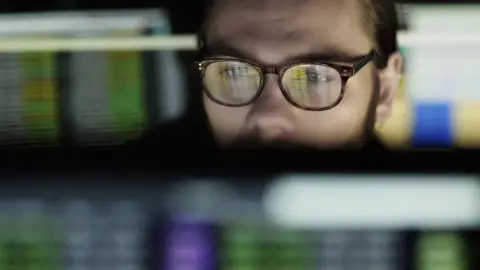Police corruption: Editors fear police guidance on links with journalists
 Getty Images
Getty ImagesEditors have questioned police guidance that they say links journalists with corruption, and "equates them with the wrongdoing they work to uncover".
National College of Policing guidelines say officers should declare relationships with journalists, just as they have to with convicted criminals.
But the Society of Editors says journalists should not be included on a list of "notifiable associations".
The guidelines only came to light earlier this year.
Writing to the College of Policing - an independent arm's-length body of the Home Office - the Society of Editors and the Crime Reporters Association said it was alarming that the guidance had only become public after it was referenced in a report by Her Majesty's Inspectorate of Constabulary (HMICFRS).
Footnotes in the report indicate the counter-corruption guidance has existed since at least 2015. It follows the recommendation from Lord Leveson in 2012 that contacts between the police and the press should be formally reported.
The HMICRCS report looked at the findings of the Daniel Morgan Independent Panel, tasked with investigating relationships between corrupt police officers, private investigators and journalists involved in the unsolved murder case of a private investigator.
Following the panel's findings of "institutional corruption" last year, the inspectorate was highly critical of the Metropolitan Police's current counter-corruption policies and contrasted them with the College of Policing's guidance, known as Authorised Professional Practice.
It said the Met Police's approach was out of date, especially regarding "notifiable associations".
These are connections with - for example - people who have unspent criminal convictions, or police officers who have been dismissed or those who now work as private investigators.
The Metropolitan Police is currently deciding whether to implement the College of Policing's guidance.
The Society of Editors, which has about 400 members from UK national and regional media, said including journalists in a list of notifiable associations gave the wrongful impression that reporters seek to corrupt or deceive.
Removing journalists from the list would help the police and media work together to benefit the public, it added.
The campaign group Hacked Off, created after the phone-hacking scandals, strongly disagreed.
Its chief executive Nathan Sparkes said it was "essential" to tackle "corruption between police officers and the press".
He said: "Given the history of unlawful activities between some police officers and the press, requiring the fact of any relationships to be disclosed is reasonable."
While the wider guidance on counter-corruption is available online, the section on so-called notifiable associations is restricted and cannot be viewed by the public.
The College of Policing said journalists have an important role in holding police to account and supporting the service with news stories including appeals for information.
It added that the guidance should not impede healthy relationships between the police and the media.
Index on Censorship, which campaigns for free speech worldwide, said it was increasingly concerned British police saw journalists as unsavoury or potentially disreputable - a view more usually seen in authoritarian regimes, not advanced democracies.
